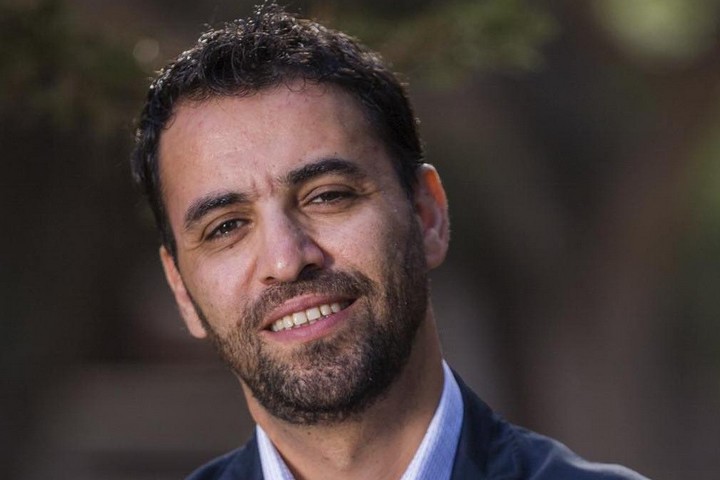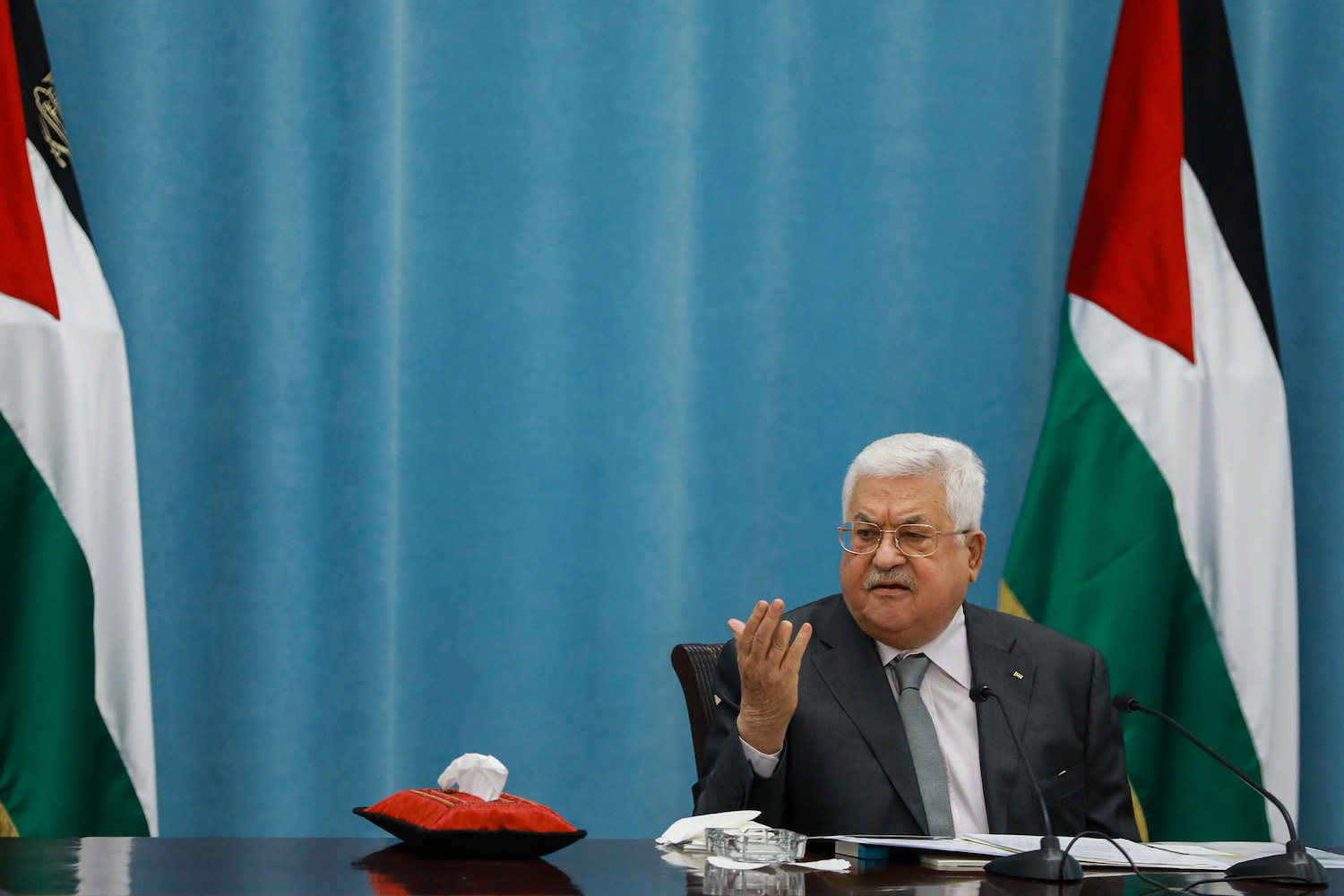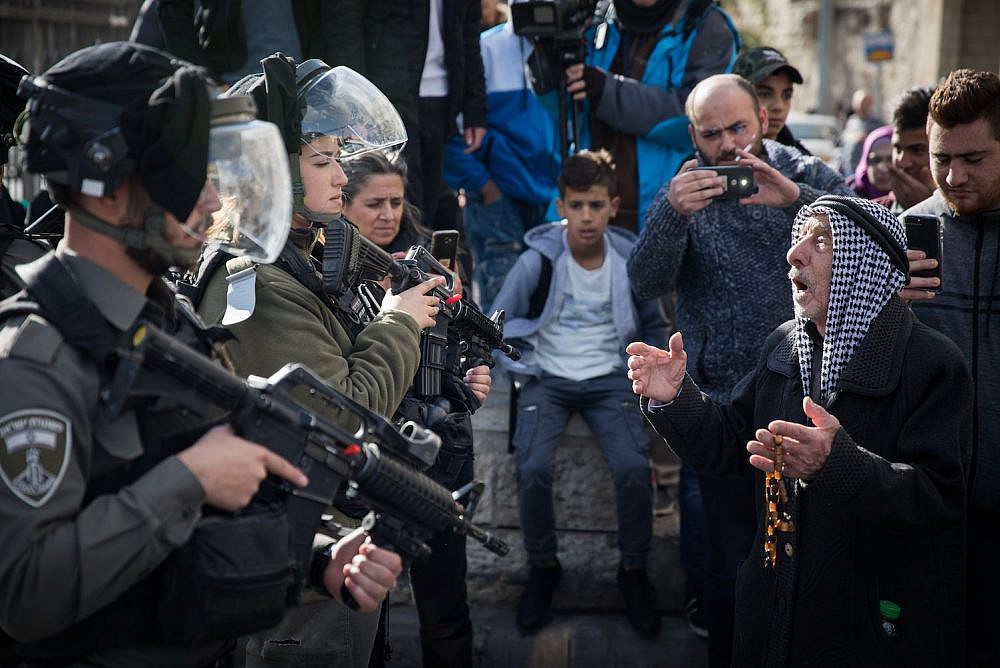With days left before Israeli Prime Minister Benjamin Netanyahu’s self-declared July 1 date for extending Israeli sovereignty to all West Bank settlements, the outcome of annexation still remains unclear. But for anyone who wants to get a sense of what things will look like on the other side, East Jerusalem offers a possible model.
The area, home to over 300,000 Palestinians, was annexed in 1967 according to the same logic of “maximum land, minimum Palestinians,” despite being a part of the West Bank, from which it has been forcefully disconnected.
Aziz Abu Sarah, 40, is a political activist and former +972 contributor from East Jerusalem who ran in the city’s mayoral election two years ago, even though, like most East Jerusalemites, he is a permanent resident rather than an Israeli citizen. He believes that Palestinians in the West Bank can learn much from the experience of their counterparts in East Jerusalem, and that they should take steps accordingly — starting now.
Do you think annexation is actually going to happen?
“It’s hard to know, but I assume so. I’d be surprised if it did not.”
There are still many unanswered questions about annexation, which had previously only been presented as a remote possibility. As someone who has lived their entire life in annexed territory, what do you see as the most significant meaning of annexation based on the East Jerusalem model?
“Israel wants to annex the territory solely for its own benefit, without taking any responsibility for the people whose lives will deliberately be made more difficult. When residents of East Jerusalem began moving to the West Bank, they did so because life in Jerusalem had become intolerable, in terms of [lack of] building permits, education — every aspect of life under Israeli rule. For Palestinians, this makes life much harder.”
So the East Jerusalemite experience has been one of ‘quiet’ ethnic cleansing: making life so difficult that people leave of their own accord.
“It isn’t really a secret, nor is it necessarily a [specifically] right-wing agenda — it’s on the center-left too. [They] use every means available, such as the separation wall, in order to push as many Palestinians as possible out of Jerusalem. They make it difficult to get building permits so that people will be forced to leave the city and build on the other side of the separation wall. That’s what happened to my family — they built a house in the [West Bank] and then came back to rent an apartment in Jerusalem that was totally unsuitable for housing a family. We have land in [the East Jerusalem neighborhood of] Wadi Joz, but we haven’t been permitted to build anything, so my father built a house in al-Azariya, about 10 minutes away.
“When I was 16, I was denied a [Jerusalem resident] identity card. They demanded that I prove I live in Jerusalem. For months, I had to sneak to school and every time I was caught by soldiers, they would beat me. So my parents decided to rent an apartment in Jerusalem. We moved into a two-bedroom place — me, my parents, and my two brothers who were married with children. I slept in the kitchen with four or five kids. That was the choice annexation imposed on us: either to live in desperate conditions or to go to Ramallah and live a normal life.
We can phrase the logic of annexation as ‘maximum territory, minimum residents who are turning into guests on their own land.’
“That’s right, guests who are really not wanted. ‘We don’t like that you’re here but we have no choice, so we’ll do all we can to make your life hard until you leave.’ This is already happening in Area C [of the West Bank, which is under full Israeli control] — people are moving to Areas A and B [under full and partial Palestinian control, respectively], mostly because Israel is making life difficult for them.
“I don’t think that Bibi or [Benny] Gantz are planning to include the Palestinians living in the areas slated for annexation. I doubt they’ll give them blue identity cards [held by permanent residents and citizens]; I believe they think it was a mistake to give them to [residents of East Jerusalem].

Another dimension of annexation in East Jerusalem is the crushing of local communities and leadership. Israel’s desire to display sovereignty has turned every balloon with the colors of the Palestinian flag into a threat that can lead to the closure of an event or cultural center.
“I have no doubt that this will happen in the areas to be annexed. If people have a living culture and identity, they’re going to struggle against a regime that denies them rights and the ability to be Palestinian.”
Perhaps the lesson Palestinians in the West Bank need to take from the Jerusalemite experience is that instead of fighting annexation — which Israel is going to force on them anyway — they should instead be fighting for equal rights? For an Israeli identity card, for example?
“That’s exactly what I think. According to the polls I’m seeing, the number of Israelis in favor of annexation has increased significantly over the past 20 years. The reason for this is that people don’t see it as a demographic threat to Israel, because they’ll be taking the land without the people. If that’s the case, you need to say to Israel: excuse me, but this isn’t happening. If you take the land, you need to also take the people [on it] as citizens. If we don’t insist on this, I don’t see any other way of fighting annexation.
‘We are on our own’
“This is precisely the problem with the Palestinian Authority: their threats don’t scare Israel. When Palestinian Prime Minister Mohammad Shtayyeh says that if Israel goes ahead with annexation, ‘we’ll declare a Palestinian state on all the land between the river and the sea’ — so what? What will that do? You don’t have any power. It’s not like in the book of Genesis, where God says, ‘let there be light,’ and there is light. It would even help Netanyahu and the right, because they’ll say, ‘great, they’ve made a few bombastic declarations and, as usual, nothing will happen.’ People always play Israel’s game, and it doesn’t get you anywhere.
“This is exactly what I tried to do in Jerusalem. To say, ‘You want Jerusalem to be part of Israel? OK, then are you prepared to have an Arab mayor?’ And suddenly there’s a panic, and people say it’s unacceptable. Sadly, the Palestinian Authority also opposed [my run], because they were afraid that residents of the West Bank would take something from it and think that there’s no more need for the PA. The idea of a new, young Palestinian leadership is very frightening for these guys, who are all over 70.”
As part of the Oslo Accords, the PA acquiesced to Israel’s demand that it stay out of East Jerusalem, thereby giving up on the city and its residents. Do you think the same thing will happen in annexed areas in the West Bank?
“From what I’ve seen in their statements, they have no plan or strategy regarding what they’ll do. They’ve made a lot of noise and speeches but ultimately they have no plan. In fact they didn’t just give up on East Jerusalem in the Oslo [Accords], but also the residents of Area C by relinquishing all authority in these areas. I think they didn’t really understand what they were signing. They weren’t prepared for ‘what if’ scenarios. What if Israel doesn’t meet its commitments after five years? There was no looking to the future, and we’re dealing with the exact same people now.”
“I will tell you something that I didn’t intend to share, but yalla, I’ll say it: a few months ago I attended a meeting in which Saeb Erekat spoke, and he said, ‘If this annexation goes forward, others and I who live in the Jericho and Jordan Valley area will demand Israeli citizenship.’ Of course, he will not do this, he is bluffing, and Israel already knows that. If he goes ahead with it, I will be positively surprised, but the chances are close to none.

“The central lesson I have learned in life as a Jerusalemite is ‘you are on your own.’ The residents of East Jerusalem know this well: we have no reason to trust [Palestinian President] Mahmoud Abbas, the Palestinian Authority, or Israel. We saw this also during the coronavirus crisis: people created incredible support networks independently, because they understood that if they were to wait for the PA, nothing would happen, and Israel was certainly not going to take care of them. And this is what the residents of the Jordan Valley must understand: they have no support and they will not get help from anyone. Not the PA, not the EU, and not from Israel. This is important because it will impact the way they organize. Of course, once they begin to organize politically, the PA will do everything to stop them because it poses a risk to the Authority.
If annexation is carried out, what does it say, in your opinion, about future possible solutions?
“First, it is obvious that in light of annexation, any person who still believes in the two-state solution is lying to themselves. Tzachi Hanegbi [an Israeli minister and member of the Likud party] said it explicitly to the settlers: ‘Don’t worry, a Palestinian state will not exist.’
“I also don’t see the left winning anytime soon. Even if it does, what is ‘the left’? The Labor Party that is part of this annexationist government? [Centerist opposition leader] Yair Lapid? I say this to the Palestinians before the Israelis: we must understand that the dream of a Palestinian state is currently a sort of tranquilizer. It calms us down, but we know it is a lie. A Palestinian state, the way we have envisioned it, will not come to be.
“So, what are the other options? Either a federation or confederation, or one state. I don’t think there are many options. I am actually okay with either of these two possibilities, because if there is a kind of federation, it will give expression to the national identities of each people, and in the case of one state, I am a great believer in the democratic ideal. If Israelis and Palestinians learn to somehow live together, a single state will offer a different kind of balance between religious and secular communities — a balance that does not exist in either state.
“When I ran for mayor, one of the funniest conversations I had was during an interview at an ultra-Orthodox radio station. It was one of the more respectful conversations I had had. The man who interviewed me was so generous and fun to talk to, he asked serious questions, but in the end he said something that made me laugh: ‘You know what, I am not that opposed to you winning the election, because we will get along with the Muslims, we will work together to stop these secularists.’ He clearly did not know me, but there is a point in what he said: there is a large religious Muslim community in East Jerusalem, and if it were to organize and run in municipal elections, I can see how it would work together with the ultra-Orthodox. I think these communities can get along very well also on a national level, although it will not be the kind of country I would want to live in.”
A version of this article was first published in Hebrew on Local Call. Read it here.


